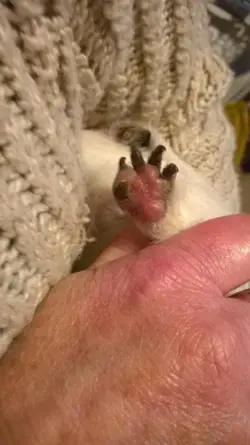The swollen front paws have not responded to metacam (anti-inflammatory) or antibiotics This would indicate there is more going on than just arthritis or infection. Also please be careful about "tagging" symptoms with a condition off the internet (ie bumblefoot) as it could send your vet off in the wrong direction.
Your piggie is 5 year old and weighs 1.4kg - which compared to her cage mate is quite a hefty weight. Given the swollen paws have not responded to metacam and abx, I would suggest that the fluid accumulation could be coming from a different source - i.e. a developing heart/kidney condition.
It is not unusual for a heart pig to show fluid accumulation (oedema) in forepaws and also in the abdomen/around the heart - which would also account for her 1.4kg weight.
You may also want the vet to look for signs of abdominal breathing (as opposed to just chest movement) She may also have a transient blue-grey tinge to her lips (if pink) and her ears may be dark at the edges (again indicative of circulatory/heart issues). There are other signs including periodic/spasmodic respiratory "hooting" , lots of time spent asleep etc etc
Bumblefoot (infection and swelling of paws) is also indicative of a heart and circulatory issue.It is a symptom which some vets try to treat "in it's own right" as a condition without idenitifying and treating the underlying cause..
If your vet is not that cavy savvy - they will listen to her heart with a stethoscope and in all likelihood say there isn't a problem. Heart pigs can only be diagnosed by XRay (to look for fluid and see if the heart is enlarged or there are problems with the kidneys). .The vet may want to take bloods for a definitive diagnosis - but given her age and the fact she may be a heart pig - I would opt for the Xray first. You will also need to go armed with the following info printed out from guinea lynx to persuade your vet....the links in the case histories contain Xray images of heart pigs to show the vet what to look for.
.
http://www.guinealynx.info/heart.html
The good news is that heart conditions are treatable and the link above gives meds and dosages (which may need adjustment over the first few weesk to get the right coursxe of meds)
The most important thing at the moment is that you need to have complete confidence that you are seeing an open-,mnded vet who, even if not experienced with heart piggirs is willing to learn and perform the required diagnostics to rule this condition in or out and prescribe any necessary treatment.
HTH
x

